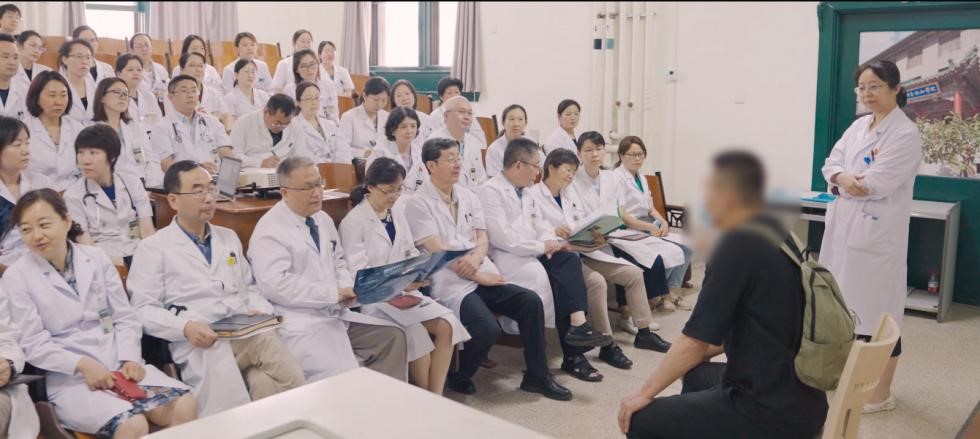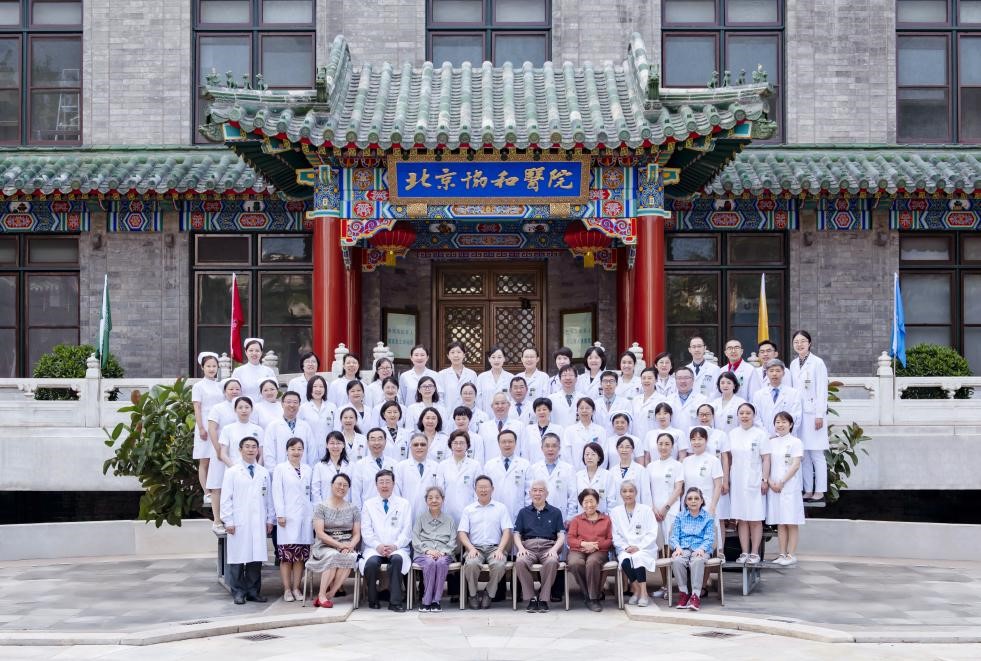Celebrated as the cradle of China’s rheumatology, PUMCH’s Department of Rheumatology can be dated back to 1979, when Professor Zhang Naizheng, the father of rheumatology in China, established China’s first rheumatology group in PUMCH, turning over a new leaf in history. Over the past 40+ years, with the strenuous efforts of generations of rheumatologists, the department has achieved fast growth, leading and witnessing the establishment of rheumatology in China from scratch and its growth from weakness to strength.
Today, the Department of Rheumatology at PUMCH has become a role model in the coordination between medical service, teaching, and scientific research. It has been ranked first in China Hospital Specialty Reputation Rankings published by Fudan University for 12 consecutive years and secured the first place in the Rheumatology and Autoimmunology in the Science and Technology Evaluation Metrics (STEM) of China’s Hospitals and Medical Colleges, making it an undisputed leader in the field of rheumatology in China.
Deep Roots in Medical Service to Benefit More Patients
With deep roots in medical treatment, the Department of Rheumatology has evolved from a three-bed small unit at its inception to a department with 68 beds, seeing more than 1,500 inpatients and over 120,000 outpatients per year. Committed to delivering more accurate diagnosis, more detailed evaluation and more effective treatment, the department specializes in the diagnosis and treatment of common rheumatic diseases such as systemic lupus erythematosus, Sjögren’s syndrome, rheumatoid arthritis and ankylosing spondylitis. It is also dedicated to the comprehensive diagnosis and treatment of rare rheumatic diseases, major organ damages and serious complications of rheumatic diseases.
Over 90% of the patients in the Department of Rheumatology are not Beijing residents, most of whom suffer not only from disease burden, but also from poor access to care. To address their urgent needs, the department has maintained an exceptionally high outpatient volume for many years. Professor Tang Fulin, the former director, frankly said: “Rheumatologists must be physically strong, with a small stomach and a large bladder, so they can consume less food and water to reduce toilet use and save time for patients.” His words speak volumes about how rheumatologists deeply care about their patients.
Thanks to its relentless efforts, the Department of Rheumatology can deliver consistently high-quality medical services despite the high visits volume. For intractable diseases, weekly ward rounds and collective consultation are conducted by a team of experts. Online treatment and video-enabled three-layered ward rounds are provided to ensure the continuity of medical care. A broad spectrum of specialized outpatient clinics is built and improved to shorten treatment cycle and improve patients’ experience.
In August 2020, the laboratory of the Department of Rheumatology completed the methodological upgrade of all items of target antigen-specific markers by replacing the enzyme-linked immunosorbent assay (ELISA) which typically requires manual handling, batch operation and qualitative detection with chemiluminescence assay which features full autonomation, real-time injection, high-throughput, and timed detection, making it able to detect more than 60 types of autoantibodies. This is also the first fully automated line dedicated to autoantibody testing in a Grade A Tertiary hospital in China, with a daily operating throughput of up to 15,000 times. The results turnaround time has been cut down to 0.5 to 1 working day, providing important support for accurate diagnosis.
Cultivate Talent with Teaching as the Foundation
The continuous development of the discipline is inseparable from talent cultivation. There are 15 doctoral supervisors and 15 master’s supervisors in the Department of Rheumatology at PUMCH, and all young physicians have obtained doctoral degrees. In view of rheumatology trends, the department has developed a tripartite talent training system which encompasses clinical, teaching and research to meet the career aspirations of young physicians and build a multilayered talent pipeline where everyone has a clear goal in mind.
In recent years, with the support of the hospital, the department has sent young physicians on overseas study tours to inculcate an international vision in them. Domestically, a variety of training programs have been rolled out to disseminate and improve the understanding and practice of rheumatology among practitioners nationwide and promote the synergistic development of this field across China. Many pioneers and eminent rheumatologists in provincial and municipal hospitals are trainees of the national advanced seminar on rheumatology and the national workshop on laboratory progress of rheumatic diseases held by the Department of Rheumatology at regular intervals. Additionally, driven by commitment to medical education, the Department of Rheumatology has compiled a series of textbooks to build a solid and advanced knowledge system for young physicians.
Push the Academic Frontier Forward by Promoting Scientific Research
Scientific research has always been at the heart of the Department of Rheumatology. Its nationwide research on autoantibody detection can be dated back to 1979. In 1988, the project “Research on the Establishment and Clinical Application of Anti-nuclear Antibody Spectrum” won the third prize of National Science and Technology Progress. In 1995, “Research on Primary Sjögren’s Syndrome” won the same award. Over the years, the department has received 13 provincial and ministerial awards, including Beijing Science and Technology Award, Chinese Medical Science and Technology Award, and China Medical Science and Technology Award.
With the department’s unswerving dedication to scientific research, 10 projects have gained the support from the Ministry of Science and Technology and 66 projects are funded by National Natural Science Foundation of China. The grants allocated by national institutions have reached RMB 240 million. The department is also leading 111 domestic multicenter clinical studies and participating in 39 international multicenter clinical studies. In the global ranking of rheumatological publications across countries, regions, and institutions, PUMCH has jumped from the sixth place in 2019 to No.1 in 2020, with an overall improvement in both quality and quantity.
In the past five years, the Department of Rheumatology has headed the formulation of 21 Chinese guidelines and consensus protocols for the diagnosis and treatment of rheumatic diseases. Among them, the “Report on Rheumatoid Arthritis in China” and “Report on Systemic Lupus Erythematosus in China” released in 2020 were first of its kind and are of particular significance because they have outlined the whole picture of the two diseases, including the status quo, clinical characteristics, development status, problems and challenges, and outlook of the diagnosis and treatment, providing a detailed reference for the national health authority in policy formulation and resource allocation.
Push China’s Rheumatology Forward with the Platform as the Cornerstone
With a global vision and a goal for win-win cooperation, the Department of Rheumatology has always been committed to the growth of China’s rheumatology and the creation of a platform which can gather like-minded practitioners to unleash the synergy.
Ten former presidents of the Chinese Society of Rheumatology of the Chinese Medical Association (CMA) are from PUMCH’s Department of Rheumatology. So is the incumbent president, Professor Zhao Yan. The department has also produced four presidents of the Chinese Association of Rheumatology Physicians of the Chinese Medical Doctor Association (CMDA). Today, at least three members of the standing committee of CMA and CMDA are rheumatologists from PUMCH.
In addition, the Department of Rheumatology is also the president unit and honorary president unit of many academic organizations, such as the Rheumatology Rehabilitation Committee of the Chinese Association of Rehabilitation Medicine, the Rheumatology and Immunology Committee of the Cross-Straits Medicine Exchange Association, the Rheumatology and Immunology Committee of the Chinese Research Hospital Association, and the Rheumatology Branch of the Beijing Medical Association.
With more responsibilities brought by extensive platforms, the Department of Rheumatology is resolved to fulfill duties and take actions to drive the growth of rheumatology in China. In 2011, the department initiated the establishment of the National Rheumatology Data Center (CRDC), a big data platform for rheumatology. In 2017, guided by the department, the China Rheumatology Consortium Alliance (CRCA) was launched. In 2019, PUMCH was officially approved to set up the National Clinical Research Center for Dermatologic and Immunologic Diseases (NCRC-DID). Under the leadership of the Department of Rheumatology at PUMCH and with the active participation of sister hospitals, a four-tier collaborative network consisting of 10 regional centers, 100 provincial centers, 1,000 local and municipal centers, and 10,000 community-level clinical study satellite units has been established for research on the etiology, prevention, control, typing, treatment, translation, application, demonstration and promotion of rheumatic diseases.
In 2018, Professor Zeng Xiaofeng of the Department of Rheumatology was elected Vice President of the Asia Pacific League of Associations for Rheumatology (APLAR). In 2019, the department was awarded the Center of Excellence by APLAR (APLAR COE). With efforts of rheumatologists at PUMCH, China’s rheumatology has attained global prominence and the hard work of Chinese rheumatologists has gained more recognition.
Win the Future by Leveraging Resources to Build a World-class Department
Thanks to the convergence of various platforms, the Department of Rheumatology has launched the world's largest database of rheumatologic diseases. As of December 31, 2021, 2,111 centers, 8,280 physicians, 246,050 patients with rheumatic diseases, 495,587 medical records, and 88,205 biological samples have been registered in the database. A multicenter real-world research system of rheumatic diseases in China has thus taken shape, shedding light on the spectrum of rheumatic diseases among the Chinese population, among which SLE and rheumatoid arthritis are the most common conditions. This has also provided a great boost to the application of information technologies, data collection and scale-up of rheumatic disease research in China.
Today, the Department of Rheumatology at PUMCH is working with top basic research teams in China, including Tsinghua University, Peking University, the Institute of Military Medicine of the Academy of Military Medical Sciences, the Institute of Biophysics of the Chinese Academy of Sciences, the Institute of Basic Medical Sciences and the Institute of Pharmaceutical Sciences of the Chinese Academy of Medical Sciences, to expand the research chain of “clinical-basic-clinical” which is rooted in clinical challenges under the aim of promoting more breakthroughs in research on the pathogenesis, new targets for intervention, clinical diagnosis and treatment strategies of rheumatic diseases.
In a boat race, those who row the hardest will win. As the most time-honored rheumatology specialty in China, the Department of Rheumatology at PUMCH, inspired by the courage and exploration of the predecessors, will always keep in mind the original aspiration and mission determined at its inception, and make greater contributions to the continuous improvement of clinical study, diagnosis and treatment of rheumatic diseases in China through relentless hard work.

The Department of Rheumatology conducts grand rounds every Tuesday afternoon

Group photo of the Department of Rheumatology
Written by: Li Yuanjing
Picture courtesy: The Department of Rheumatology
Translator: Liu Haiyan
Editor: Jiang Nan and Wang Yao
